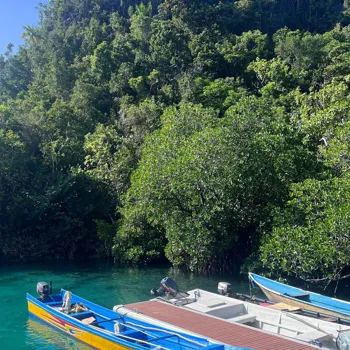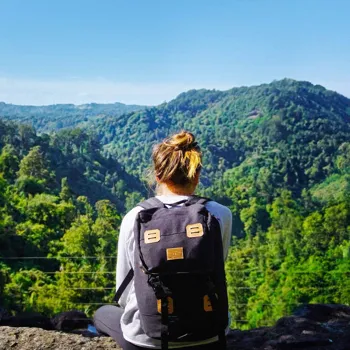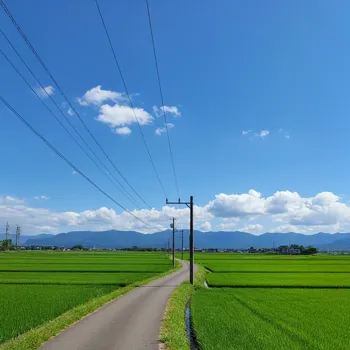Discover how to be a responsible tourist and make a positive impact with these 7 sustainable travel practices. Read more!
Namaste, globe-trotters! As travel becomes more accessible, it's crucial to think
about our impact on the places we visit. We all love exploring new cultures and stunning landscapes, but it's our duty to do so responsibly.

This means adopting 'sustainable travel practices', ensuring our adventures don't harm the environment or local communities. Think of it as leaving only footprints and taking only memories and photographs. So, how can you be a responsible tourist?
Let's explore seven simple yet effective ways to minimize your footprint and maximize your positive impact. After all, sustainable travel is not just a trend; it's the future of exploration!
Reduce baggage weight for eco-friendly travel; pack light, go digital
First, let's talk about 'travel light'. Do you really need that fifth pair of shoes? Reducing your baggage weight can significantly decrease fuel consumption on flights. Airlines burn less fuel, leading to lower carbon emissions.

Packing light also makes your journey easier, allowing you to use public transport or walk more, further reducing your carbon footprint. Consider buying travel-sized toiletries to avoid carrying large bottles. Choose versatile clothing items that can be mixed and matched.
You'll be surprised at how much lighter you can travel without sacrificing comfort or style. Trust us, your back (and the planet) will thank you! Furthermore, think about digital alternatives to traditional travel guides. Instead of lugging around heavy books, download e-books or use travel apps.
This reduces paper waste and saves space in your bag. Remember, every small effort counts when it comes to sustainable travel.
Choose eco-friendly accommodation for sustainable travel impact
Next, let's look at 'choose eco-friendly accommodation.' When booking your stay, look for hotels or guesthouses that have implemented sustainable practices. This might include using renewable energy, conserving water, reducing waste, and supporting local communities.

Many hotels now display their sustainability credentials on their websites. Look for certifications such as LEED or Green Globe. Even better, consider staying in locally owned guesthouses or homestays.
These establishments often have a smaller environmental footprint and provide a more authentic cultural experience. Plus, your money goes directly to the local community, supporting their livelihoods. Don't be afraid to ask your hotel about their sustainability initiatives.
By choosing eco-friendly accommodation, you're sending a message that you value sustainability and encouraging more businesses to adopt responsible practices. Your choice as a tourist makes a huge difference and contribute to protect local environment.
Embrace local transport for authentic travel experience
Third, embrace 'local transport'. Ditch the taxis and embrace the local flavour by using public transport such as local buses, trains, or rickshaws. It's not only a greener option but also a fantastic way to immerse yourself in the local culture. Walking and cycling are even better!

They're great for your health and allow you to explore at your own pace, discovering hidden gems along the way. Rent a bicycle and explore the city like a local. You'll be surprised at what you discover.
If you must take a taxi, try to carpool or choose electric or hybrid vehicles whenever possible. Before you leave, research the public transport options available in your destination. Many cities have excellent public transport networks that are easy to navigate.
By using local transport, you're reducing your carbon footprint, supporting local businesses, and experiencing the destination in a more authentic way. Your journey will be richer and greener!
Support local businesses for sustainable tourism and community growth
Fourth, think about 'support local businesses'. One of the best ways to support local communities is by shopping at local markets, eating at family-run restaurants, and buying souvenirs from local artisans. Avoid large chain stores and restaurants that take profits away from the local economy.
When you buy locally, you're supporting local livelihoods and helping to preserve traditional crafts and customs. Talk to the shopkeepers and artisans to learn about their products and their stories. You'll gain a deeper appreciation for the local culture and create meaningful connections.
Be mindful of the impact of your spending and choose businesses that prioritize sustainability and ethical practices. By supporting local businesses, you're contributing to a more equitable and sustainable tourism industry.
Enjoy the unique flavors and crafts of the region while making a positive impact.
Respect local culture when traveling for enriching experiences
Fifth, 'respect local culture'. Before you travel, take the time to learn about the local customs, traditions, and etiquette. Dress modestly when visiting religious sites. Ask permission before taking photos of people. Learn a few basic phrases in the local language.

Be respectful of local customs and traditions. Avoid behaviors that might be considered offensive or disrespectful. Remember that you are a guest in their home. Be open-minded and willing to learn from the locals. Engage in conversations and show genuine interest in their culture.
By respecting local culture, you're demonstrating that you value their heritage and way of life. This fosters positive relationships between tourists and local communities and promotes intercultural understanding. Your respectful attitude will be appreciated and make your experience more enriching.
Reduce, reuse, recycle to minimize environmental impact
Sixth, 'reduce, reuse, recycle'. This mantra applies to travel as much as it does to everyday life. Bring your own reusable water bottle, shopping bag, and coffee cup. Avoid single-use plastics whenever possible. Refuse plastic straws, cutlery, and bags. Choose products with minimal packaging.

When you have waste, recycle it properly. Look for recycling bins and dispose of your waste responsibly. If recycling facilities are not available, take your waste with you and dispose of it properly when you return home. Consider buying products made from recycled materials.
By reducing your waste, reusing items, and recycling properly, you're minimizing your impact on the environment and helping to conserve resources. Your responsible actions will inspire others to do the same.
Offset your carbon footprint by donating to reputable programs
Seventh, ‘Offset Your Carbon Footprint’. Air travel is a significant contributor to carbon emissions. While reducing your baggage weight and choosing direct flights can help, it's impossible to eliminate your carbon footprint entirely.

Consider offsetting your carbon emissions by donating to a reputable carbon offset program. These programs invest in projects that reduce carbon emissions, such as renewable energy projects, reforestation projects, and energy efficiency initiatives.
Do your research to ensure that the program is credible and has a measurable impact. You can also choose airlines that offer carbon offsetting programs. While carbon offsetting is not a perfect solution, it's a way to mitigate the environmental impact of your travels.
By offsetting your carbon footprint, you're taking responsibility for your emissions and contributing to a more sustainable future.
Seven ways to be a responsible tourist for sustainable travel
So there you have it – seven simple ways to be a responsible tourist. By adopting these sustainable travel practices, you can ensure that your adventures have a positive impact on the environment and local communities.

Remember, sustainable travel is not about giving up travel; it's about travelling in a way that minimizes harm and maximizes benefits. So, pack your bags, explore the world, and make a difference! Happy travels!













